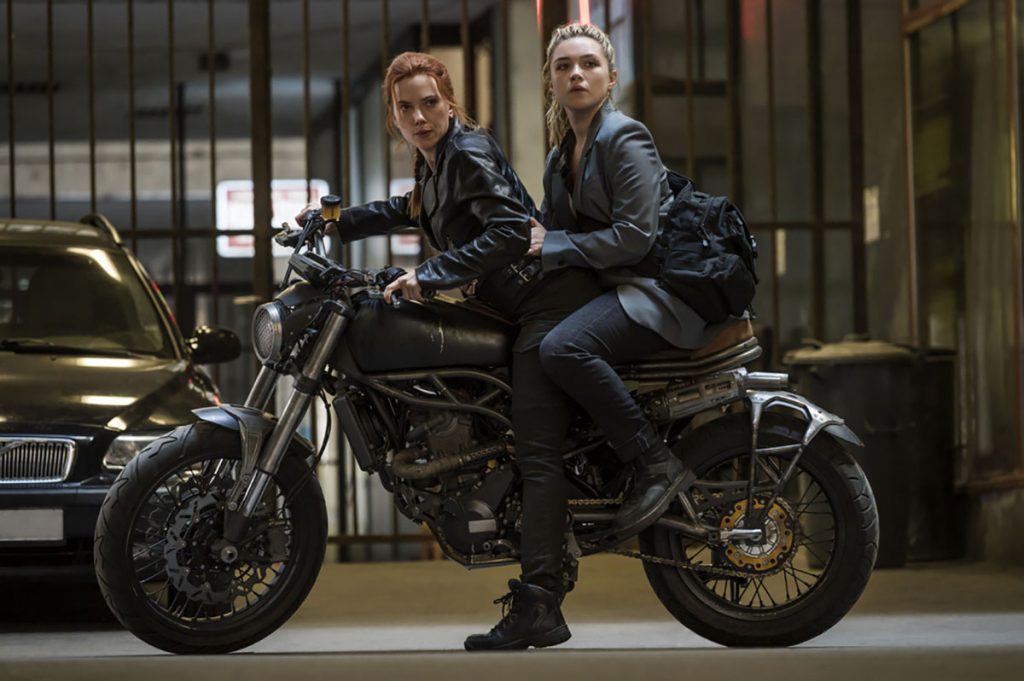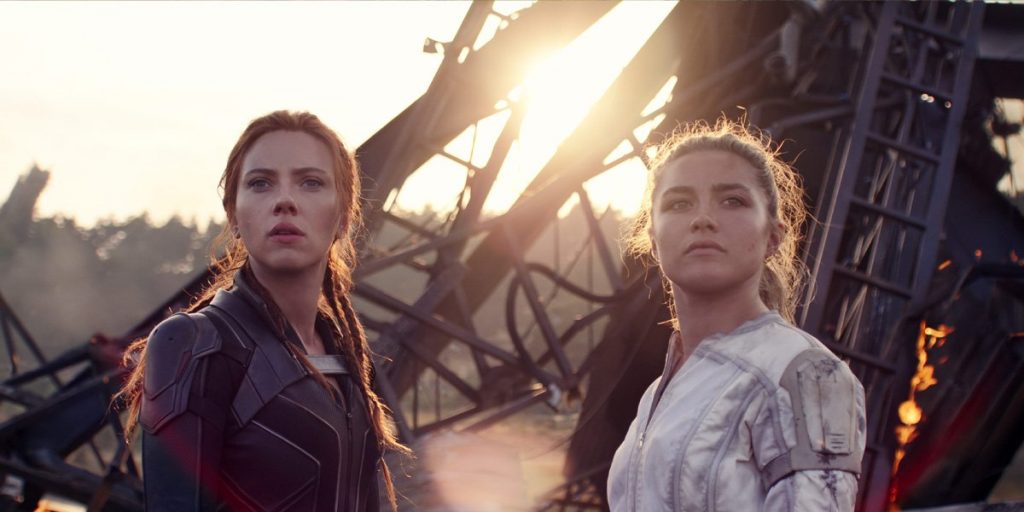Black Widow is a fitting finale for star Scarlett Johansson that simultaneously sets up captivating new characters to carry on her legacy.
Though Scarlett Johansson’s Black Widow first made her debut in 2010’s Iron Man 2, it’s regrettably taken over 10 years for the star to receive her own solo film. In that time, we’ve seen one more Iron Man film, three Captain America’s, three Thor’s, two Guardians of the Galaxy’s, two Ant-Man’s, two Spider-Man’s, and one film each for newbies Doctor Strange and Black Panther. Hell, even Brie Larson’s Captain Marvel got her own feature before Natasha Romanoff, despite the latter having put in more “work” by appearing in six pictures by that point. To make matters even worse, Black Widow’s big screen solo debut was further delayed by an enemy even the most elite super spy couldn’t have seen coming – coronavirus.
Yes, because of the pandemic, instead of premiering at the start of May 2020, Black Widow now sees itself arriving in the middle of summer 2021 – simultaneously available with Premier Access on Disney+ – with a storm of questions surrounding its long-awaited launch. Do audiences even still care about this character after all this time, especially given her untimely death in 2019’s Avengers: Endgame? Will the day-and-date release render Black Widow a box office disappointment? And how will the film fare when compared to female-led superhero features that have already hit theaters, like Wonder Woman and the aforementioned Captain Marvel?
Thankfully, it only takes mere moments for Black Widow to prove its worth as a prime work of Marvel moviemaking, kicking off with a pulse-pounding prologue that takes us back to 1995 Ohio where a young Natasha (Ever Anderson, of Resident Evil: The Final Chapter and the upcoming Peter Pan & Wendy) is living undercover with Russian agents assigned to be her “parents” – Alexei (David Harbour, of Stranger Things and Suicide Squad) and Melina (Rachel Weisz, of The Mummy and The Favourite) – and her faux sister, Yelena (Violet McGraw, of The Haunting of Hill House and Doctor Sleep). Unfortunately, after Alexei retrieves stolen intel from S.H.I.E.L.D., the foursome must up and leave their home with nearly no advance notice, fleeing to Cuba to rendezvous with the devilish General Dreykov (Ray Winstone, of The Departed and Cats), who subsequently separates Natasha and Yelena from Alexei and Melina and forces them to train in the Red Room under the Black Widow program and become deadly assassins.
Years later, before defecting to S.H.I.E.L.D, it’s revealed that Natasha (Scarlett Johansson, of Marriage Story and Jojo Rabbit) brought down the Red Room and seemingly caused Dreykov’s death by ordering the bombing of his offices – causing some “collateral damage” in the process. It’s the price she had to pay for her freedom, but that past comes back to haunt her after she’s forced on the run in present day following her violation of the Sokovia Accords during the events of Captain America: Civil War.

Coming into contact with an adult Yelena (Florence Pugh, of Midsommar and Little Women), Natasha learns that she didn’t destroy the Red Room as she thought – it’s still operating under a very-much-alive Dreykov who, in an attempt to prevent any further rebellion among his ranks, now directs his Widows via mind control. However, Yelena has discovered a substance known as the “Red Dust” that has the ability to shake the women free of this stupor, and together, she and Natasha team up to put an end to the evil practices of the Red Room for once and for all, looping Alexei and Melina into their plans and bringing their family’s story full circle in the process.
Without a doubt, the most commendable aspect of Black Widow is its expertly assembled cast, led jubilantly by the ever-reliable Johansson, who gives this cherished character’s story the denouement it deserves with her poignant and powerful performance, deftly depicting Natasha’s mission to make peace with her mistakes and her desire to free others of the oppression she endured for decades. While we’ve all heard the horror stories and seen glimpses of Natasha’s Red Room-related pains in prior MCU pics – such as in The Avengers and Avengers: Age of Ultron – that suffering is center-stage in Black Widow, allowing for a more extensive examination of her physical and emotional trauma that textures the decade-old character in captivating new ways.
It feels incorrect to label the past cinematic incarnations of Natasha as “one-dimensional,” but the development she receives here is simply so rich and resonant that it’s almost as if she’s a new individual entirely, evolving into the more multi-dimensional being that she always should’ve been, as opposed to the designated “snarky female sidekick.” Johansson wholly grasps the woes of a woman who had her family taken from her twice and learned to lose all sense of sentimentality in order to survive, and it’s riveting to watch her reconcile between the coldness of her childhood and the empathism she’s embraced in adulthood after her time with The Avengers. In fact, were one to revisit Johansson’s prior performances, the knowledge acquired here would likely add an abundance of layers to her character work, proving that we had only scratched the surface of Natasha’s identity until now.
Equally engrossing is the phenomenal Florence Pugh, nearly stealing the show from Johansson in her MCU debut as the daring Yelena, yet another casualty of the callousness of the Black Widow program but one who refuses to let her dark past define her, striving to save her sisters by any means necessary as soon as she is freed from Dreykov’s mental domination. From top to bottom, Pugh just delivers dynamite work, capably handling the MCU’s comedic demands like a master, expertly expressing Yelena’s emotional plight (centered around her lingering anger that the family she knew as a child was “fake”) and astonishing in her action sequences with the athletic prowess of a pro. It’s as much a standout supporting role as her awe-inspiring turn as Amy in Greta Gerwig’s Little Women, and thought this isn’t likely to receive the same level of acclaim from awards bodies, it’s nevertheless yet another astounding addition to her already impressive acting catalogue – and it’s impossible to not be instantly excited for her future in this franchise.
Harbour and Weisz are certainly no slouches either, with the former allowed to go “goofier” than he does in his star-making part in Netflix’s Stranger Things, bringing the aberrant Alexei to life with blistering brilliance and balancing his humor with his heart in fetching fashion. Weisz perhaps portrays the most thinly written member of this foursome, but she still grounds the character in candor and confidence, making Melina a potent presence all the same. However, as great as Johansson, Pugh, Harbour, and Weisz are apart, they truly reach the height of their talents when they’re working in tandem, occupying the same scene and soliloquizing or squabbling as all kin do, conveying a convincing chemistry (captured compassionately by director Cate Shortland) that hammers home the film’s themes about the fortitude of “found families” and how, sometimes, the strongest bonds we make are with those who may not be our blood – and that doesn’t make these ties any weaker.
Additional accolades must be paid to screenwriter Eric Pearson (Thor: Ragnarok, Godzilla vs. Kong) for providing the foundation for this foursome to tackle this thematic material, as his script is strikingly sincere – almost disarmingly so – and the relationships here feel as real as any amongst the Avengers, who have had far longer to establish their affinity for one another. Pearson’s subtle social commentary about the use and abuse of women around the world who are robbed of their agency and adolescence to practically be “playthings” for the diabolical Dreykov is also affecting, particularly in how it parallels today’s troubles with global sex trafficking. Finally, he must be applauded for authoring a scintillating spy saga that feels almost Bond or Bourne esque in moments, with near non-stop action that serves up the sensational big-screen spectacle we’ve all been missing throughout the entirety of this painstaking pandemic. As you bask in the carefully orchestrated chaos of the film’s climax, it’s clear that the movies (and Marvel) are back at last – and better than ever.
Some may feel that Black Widow is “too little, too late,” but thanks to the film’s complex and compelling characterizations of its hearty heroines and its acutely arresting action sequences, the movie manages to make this long overdue solo/spin-off film worth the wait. While ScarJo’s time in the spotlight may be up, Black Widow offers her iteration of the character a fitting and fiery finale while simultaneously setting up a whole new subsection of the MCU that can live on and honor her legacy, investing audiences in more adventures with Yelena, Alexei, Melina, and all the other Widows as they seek to end this evil once and for all. It’s bittersweet to bid farewell to one of Marvel Studios’ initial icons before its world expanded exponentially, but it’s hard to imagine a more invigorating and inspirational coda to her character arc than this.
Black Widow is now available to watch worldwide, in theaters and on Disney+.

